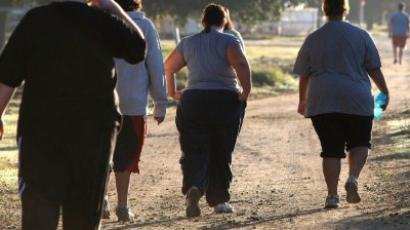Federal task force wants obese Americans placed into counseling

If you’re a US citizen, there’s a one-in-three chance that you’re also obese. Now after failed attempt after failed attempt at slimming down citizens, a federal panel is pushing to force overweight Americans into counseling.
The US Preventative Services Task Force (USPSTF) introduced their latest plans to help push down the obesity rate in America this week, and their newest effort calls for more than just urging people to exercise. The federal panel of medical experts is asking primary care physicians to put obese Americans into intensive counseling programs in order to combat the epidemic."Obesity is a very serious health problem in the United States, and in the past 30 years, obesity rates have dramatically increased," Task Force member Dr. David Grossman, a pediatrician at Group Health Research Institute in Seattle, says in the USPSTF press release put out on Monday. "The good news is that is that even modest weight loss can reduce health risks for people who are obese. And, there is strong scientific evidence that shows that intensive programs with 12 to 26 sessions in the first year can help people manage their weight."While experts have long argued for urging obese Americans into specialized programs to push healthier habits on them, the USPSTF is asking physicians to place any patient with a body mass index (BMI) of 30 or more into counseling. Currently more than one-third of adults meet that criterion, with non-Hispanic black adults more than 44 percent likely to be considered obese. According to a report compiled earlier this year by the US Centers for Disease Control and Prevention, 42 percent of the US population will be obese within the next two decades. At the time of that publishing, the Institute of Medicine’s Shiriki Kumanyika told Reuters that "People have heard the advice to eat less and move more for years, and during that time a large number of Americans have become obese.” Advice, many argue, hasn’t been enough, though. “The average person cannot maintain a healthy weight in this obesity-promoting environment,” added Kumanyika.The USPSTF has been urging primary care doctors to screen patients for obesity as early as 2003, but if their new guidelines are adopted, physicians will be prompted to push for counseling outside of their office. What’s more is that, if US President Barack Obama’s healthcare law passes scrutiny from the Supreme Court this week, Medicare and most private insurers will be forced to cover most or all of the proposed counseling programs — something that is certain to attract opponents of all size. If justices in Washington refuse Obama’s plan, however, the recommendations will likely be refused. “Having this guidance is really important, and my hope is that it will push forward greater reimbursement of these programs,” Dr. Donald Lloyd-Jones of Northwestern University’s Feinberg School of Medicine tells Kaiser Health. Last November, Medicare agree to begin reimbursing physicians for offering "intensive weight counseling” to the 14 million American insured by the government program, the Los Angeles Times reports. If the task force’s recommendations are adopted, the number of Americans entering treatment — and on the government’s dime — is expected to increase.














